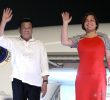“My taxes are sent (here) for military aid. Money should build roads, should be given to health care, decent things for the people, not military aid,” says Ron Gochez of Union del Barro, Los Angeles.
By Tyrone Velez
Davao Today
DAVAO CITY, Philippines– Appalled that they saw more soldiers than rehabilitated homes in Typhoon Pablo-affected areas, an international mission urged the Aquino administration to pull out its troops and bring immediate help to the hinterlands.
They also called for accountability from the United States government for “misusing” its aid in the country, as well as responsibility from the Philippine government for permitting extractive industries like mining and logging that worsen the impact of the disaster.
The 39-member International Solidarity Mission went to communities in Brgy. Panansalan, Compostela town; Talaingod, Davao del Norte and Andap, New Bataan last July 13 to 16. The humanitarian group Balsa Mindanao, environment alliance Panalipdan Southern Mindanao and the Pablo survivors group Barug Katawhan (People Rise Up) co-sponsored the mission.
Speaking at a press conference, mission head Reverend Frank Wulf of the United Methodist Church USA said they were moved at seeing the devastation in Andap. “Had government not permitted mining and logging in these places, the devastation and flooding would have been less,” said Wulf.
He said their group would lobby the US government to change its policies in providing aid and investments in the Philippines.
“It is not right to take other resources to feed our lifestyle. It has to start with change with the US government. Cheap cellphones are not worth the lives at risk,” Wulf expounded.
Rose Dominguez, a Filipino-American and AnakBayan USA member said “(T)hese companies plundered the environment to the point that the communities became vulnerable. Typhoon Pablo (was) not a natural disaster but a man-made disaster.”
Ron Gochez, a Hispanic union leader from Union del Barro Los Angeles, lamented that it was “appalling to see the military in the houses of the people, and the military taking our pictures.” He showed reporters mobile phone pictures of the soldiers.
He added that he was also “concerned” that 70% of the US military aid is poured in to Southern Mindanao. “My taxes are sent (here) for military aid. Money should build roads, should be given to health care, decent things for the people, not military aid.”
The Armed Forces of the Philippines (AFP) has declared Southern Mindanao as one of the strongholds of the revolutionary New Peoples’ Army. The AFP Eastern Mindanao Command was tasked by President Aquino to head the operational command for relief and rehabilitation in Pablo-stricken areas last December.
But Barug Katawhan leader Karlos Trangia said the military is exploiting the relief for its counter-insurgency program Oplan Bayanihan, where they encamped in communities and harass local activists including him. One of Barug’s leader, village councilor Cristian Jose from Baganga, Davao Oriental was killed last March by motorcycle-riding gunmen.
Dominguez said it “saddened” her that the youth and children are the most affected from both disaster and militarization. She and other Fil-Ams went to Talaingod and saw “indigenous pupils not in school any longer because they were afraid of the soldiers.”
The international mission also demanded transparency of the government’s relief and rehabilitation funds because they saw many farms, houses and schools still needing repair.
“Until now, many including myself still live in makeshift houses. Even the tarpaulins which were donated to us were already torn,” Trangia noted.
To this, Kuusela Hilo, a Filipino-American and member of the International League of People’s Struggles said “(T)he person we would like to talk to (when we get to Manila) is President Aquino. He should answer where the relief went and why soldiers are in Pablo areas. Depriving victims like Karlos of relief is a violation of his rights.”
The mission members also called for the resumption of peace talks with the National Democratic Front to address socio-economic reforms. The United Methodist Church had earlier issued resolutions calling for the resumption of talks.
The mission donated Php 12,000 to banana plantation workers in Osmeña, Compostela who were laid off and were refused rehiring by its employer, a Korean-owned company.
The mission was participated by Americans, Fil-Ams, Latin Americans. They would bring the results to the International Conference on Human Rights and Peace, to be held in Quezon City on Friday. (Tyrone Velez/ davaotoday.com)
compostela valley, davao oriental, davao oriental pablo areas, Human Rights, international solidarity mission, Liberation Movements, pablo areas, talaingod, typhoon Bopha, typhoon Pablo









